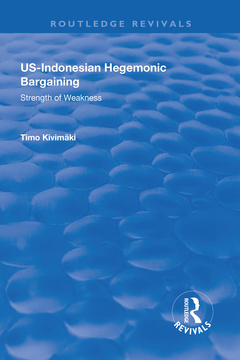Description
US-Indonesian Hegemonic Bargaining
Strength of Weakness
Routledge Revivals Series
Author: Kivimäki Timo
Language: English
Subject for US-Indonesian Hegemonic Bargaining:
Keywords
Hegemonic Bargaining; United States; 11 September 2001; West Irian; International; Soviet Card; Relations; Madiun Rebellion; Terrorism; Malaysian Confrontation; East Timor; West Irian Dispute; Jones Papers; Independence Negotiations; United Nations Good Offices Committee; Bacharuddin Jusuf Habibie; East Timor Issue; Hegemonic Order; IMF Package; Indonesian Economic Crisis; Hegemonic Decline; Renville Agreement; Round Table; Round Table Conference; Linggadjati Agreement; Human Rights Concessions; Indonesian Foreign Minister Ali Alatas; IMF Agreement; CIA Involvement
Approximative price 103.03 €
In Print (Delivery period: 14 days).
Add to cartPublication date: 12-2017
· 15.2x22.9 cm · Hardback
Publication date: 10-2019
· 15.2x21.9 cm · Paperback
Description
/li>Contents
/li>Biography
/li>




